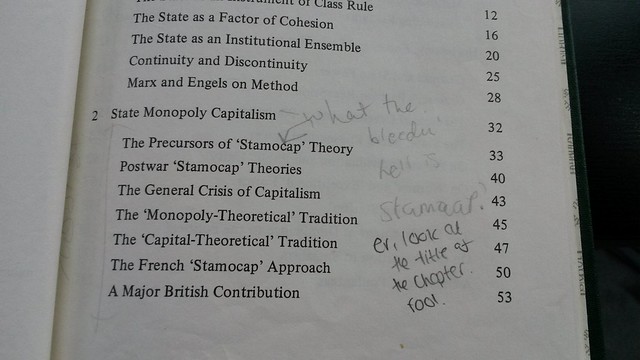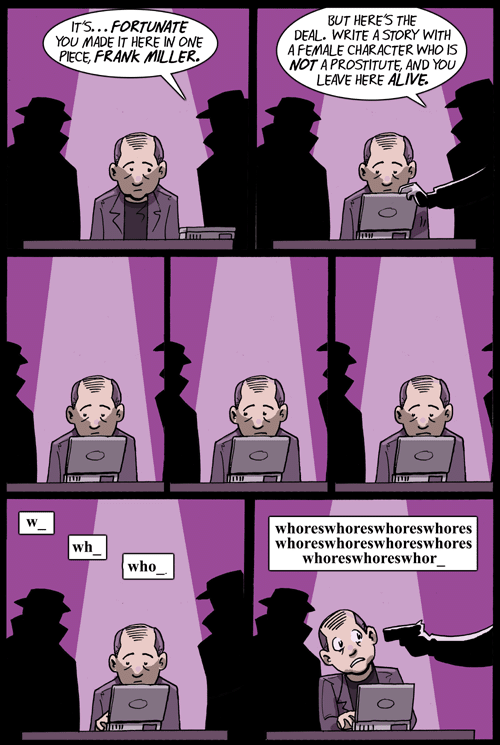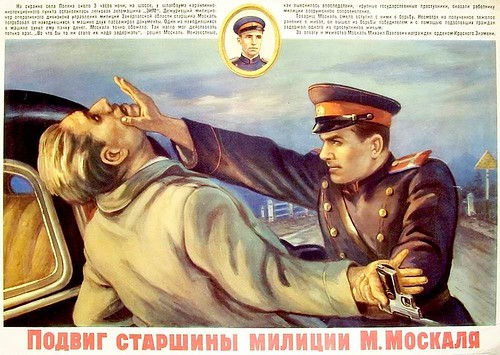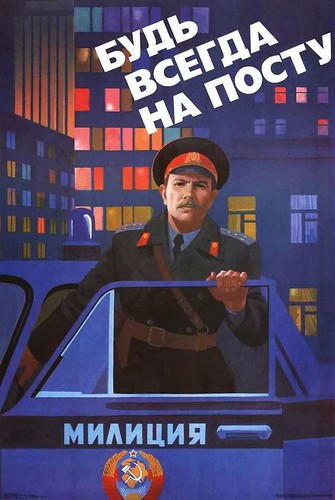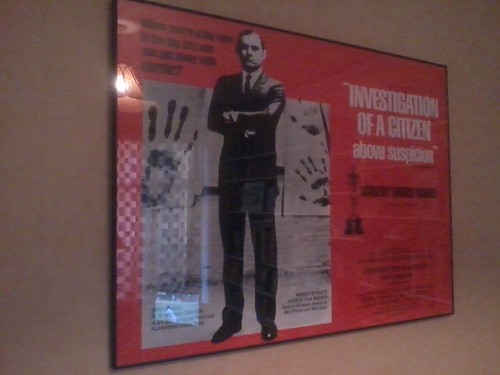From Kaleb Horton's piece "On Donald Trump and Preying Upon Weakness".We’re not in a Frank Capra movie. Gary Cooper is not going to give Trump his comeuppance. He is not going to die of his own mania in a burning barn or find God and quit the race to become a missionary. He is not a grand conspiracy meant to sneak Hillary Clinton into the White House. Denial accomplishes nothing.
He’s not desperate and he’s not losing.
And retreating to the comfort of our curated peers on social media, where everybody knows Trump is a villain, gets us nowhere. We don’t need better or smarter or funnier or more marketable ways to call him a villain. We don’t need to split hairs on whether he’s a fascist or just an almost-fascist. We don’t need any more hyperbole soloing. That won’t change the mind of a single Trump supporter.
Wednesday, December 09, 2015
Gary Cooper Is Dead
Monday, November 09, 2015
Reduce Speed Now
And while it's not as good as the others, Michael Jackson's "Bad" played this way is very Trent Reznor at the start:
Sunday, October 11, 2015
Friday, September 18, 2015
A Very Dangerous Drug for Young Men
This is why Joy Division can be a very dangerous drug for young men. They seem to be presenting The Truth (they present themselves as doing so). Their subject, after all, is depression. Not sadness or frustration, rock's standard downer states, but depression: depression: whose difference from mere sadness consists in its claim to have uncovered the (final, unvarnished) Truth about life and desire.
The depressive experiences himself as walled off from the lifeworld, so that his own frozen inner life - or inner death - overwhelms everything; at the same time, he experiences himself as evacuated, totally denuded, a shell: there is nothing except the inside, but the inside is empty.
...
The Aesthetes want the world promised by the sleeves and the sound, a pristine black and white realm unsullied by the grubby compromises and embarrassments of the everyday. The empiricists insist on just the opposite: on rooting the songs back in the quotidian at its least elevated and, most importantly, at its least serious. 'Ian was a laugh, the band were young lads who liked to get pissed, it was all a bit of fun that got out of hand...' It's important to hold onto both of these Joy Divisions - the Joy Division of Pure Art, and the Joy Division who were 'just a laff' - at once. For if the truth of Joy Division is that they were Lads, then Joy Division must be the truth of Laddism. And so it would appear: beneath all the red-nosed downer-fuelled jollity of the past two decades, mental illness has increased 70% amongst adolescents. Suicide remains one of the most common sources of death for young males.
Thursday, September 10, 2015
Saturday, June 27, 2015
Friday, May 08, 2015
Friday, April 10, 2015
Sunday, April 05, 2015
I'll Be There For You
Ross' behavior becomes more erratic. No one has seen Chandler for weeks. Ross keeps making stews. No one sees him go to the grocery store
— Jordan Shiveley (@jmshiveley) April 3, 2015
@jmshiveley Yet the stews continue. Ross eyes are dark wells and his gums start to recede. The stews continue.
— Jordan Shiveley (@jmshiveley) April 3, 2015
@jmshiveley Ross just mumbles incoherently about "THE DEEP KNOWLEDGE AND THE CRIMSON HUNTRESS MOTHER" when asked any question.
— Jordan Shiveley (@jmshiveley) April 3, 2015
@jmshiveley Joey has gone missing
— Jordan Shiveley (@jmshiveley) April 3, 2015
@jmshiveley The skin around Ross' mouth is grey and leathery. He doesn't seem to cast a shadow. All he does is make more and more stews.
— Jordan Shiveley (@jmshiveley) April 3, 2015
Rachel begins to delve into occult studies in response to Ross' change. She becomes thrice marked to the Crone and Crow, daughter of Shadows
— Jordan Shiveley (@jmshiveley) April 3, 2015
@jmshiveley She tries to enlist Monica to strengthen the binding rites of the Unsung Silent Ones. Monica threatens to tell Ross
— Jordan Shiveley (@jmshiveley) April 3, 2015
@jmshiveley Monica disappears. Rachel can now see the Forms that Move Beneath. It all becomes so clear. She knows what must be done.
— Jordan Shiveley (@jmshiveley) April 3, 2015
@jmshiveley Rachel treads the Mansions of Silence. The taste of iron on her tongue and lips crimson stained. There are no more boundaries.
— Jordan Shiveley (@jmshiveley) April 3, 2015
Phoebe merely sits atop the Throne on Nine Cold Flames in the Pit of Unending Eyes. Everything has gone according to her prophecies.
— Jordan Shiveley (@jmshiveley) April 3, 2015
Tuesday, March 31, 2015
Three Megabytes of Hot RAM
Sunday, March 22, 2015
Richard "Snakey Spine" Plantagenet
Half the country – and the twee half at that – seems to be getting in a tizzy about a man who, given the medieval level of state formation, was basically a fucking gangster; and what’s more a gangster among gangsters: the royals were all gangsters until Cromwell taught them a little circumspection. That little princes in the tower wet job should be a clue with Richard, but there seems to be a general feeling that it was dignified by being done as statecraft. Or maybe it's a Kray twins thing: 'they only murdered their own', etc
Sure, he was a lawgiver: so was Lucky Luciano. And sure, there was that time in 1215 when the underbosses ganged up on a weak capo and took a bunch of diabolical bleeding liberties. But Richard ‘Snakey Spine’ Plantagenet played the same role in Our Island Story as Jake ‘Greasy Thumb’ Guzick did in the history of Chicago. Under a car park is exactly the right place for him, at least in the absence of a flyover or a crocodile filled swamp.
Sunday, March 08, 2015
Wednesday, February 25, 2015
Thursday, January 22, 2015
Tuesday, December 09, 2014
Sunday, November 30, 2014
Achilles on the Plains
Like Achilles, Roman Nose had stayed out of the morning battle, and like Achilles, his absence had been keenly felt by his warriors. The day before he had destroyed the charm of his sacred war bonnet. One of the taboos connected with it was that he must not eat food taken from the pot with an iron implement. At a feast given by the Sioux, Roman Nose ate meat served by a squaw with an iron fork. Tall Bull, his friend, called his attention to the error and urged him to take purification ceremonies at once. But that very night Forsyth's command was discovered and Roman Nose had no time for the ceremonies before the battle.
He stayed out of the first charge, saying he would die if he made it. But he was such a power that the other Cheyennes kept urging him. In mid-afternoon he suddenly decided to go into the fight. Putting on the war bonnet, he mounted. With a wave of his great arm, the giant summoned his warriors. A moment later they were charging.
Forsyth's men fought this new danger desperately. At the dead run, Roman Nose thundered down upon them. Just before he reached the trenches, a shot from some bushes to one side, brought him crashing down. Jack Stilwell and two companions were hiding there. Roman Nose's followers scattered.
The place where Roman Nose fell was on the river bank. Painfully he dragged himself out of sight among the bushes. There was he found by his people and carried away. He died in the Cheyenne village that night.
Sunday, November 09, 2014
"But I Love...I Love All...All People..."
Thursday, October 30, 2014
Tuesday, October 07, 2014
Computer Security
New computer security question #1: "As a child, what color was the bucket that you used to bring water from the nearest well or stream?"
— Werner Twertzog (@WernerTwertzog) September 13, 2014
Computer security question #2: "Which disease came closest to killing you before the age of 5?"
— Werner Twertzog (@WernerTwertzog) September 13, 2014
Computer security question #3: "In your experience as a child, which country's occupation army was the least vengeful?"
— Werner Twertzog (@WernerTwertzog) September 13, 2014
Computer security question #4: "What memory of violence do you try hardest to suppress?"
— Werner Twertzog (@WernerTwertzog) September 13, 2014
Monday, August 25, 2014
Dame With A W
Monday, July 28, 2014
Centenary
'I say, is it really true that the French artillery had to fire on their infantry?' Delaforce asked. 'To drive them over the top?'
'Absolutely,' Finlayson said. 'They had a mutiny. The troops wouldn't leave the trenches, so the French generals laid down a barrage on them. That soon shifted them.'
'What happened afterwards?'
'Afterwards? There was no afterwards. Why d'you think they didn't want to get out of the trenches?'
Thursday, July 17, 2014
A Storm In Macedonia
Sunday, June 22, 2014
Kohima-Imphal
Nonetheless I feel I should mention it, as my grandfather on my Dad's side was there, with the 2nd battalion of the South Lancashire Regiment. This article suggests that there are now only three surviving members of the Burma Star Association, although, of course, the vast majority of Commonwealth troops in the battle were Indian. Also, Dad tells me that Grandad never actually joined the Burma Star Association, believing it to be full of clerks and other rear-echelon types.
Friday, June 06, 2014
I Survived Able Archer 83

Heaton Chapel is just to the north-west of Stockport, so I don't fancy two year-old me's chances very much.
Friday, May 30, 2014
Minimum Wage
J.T. once asked me what sociologists had to say about gangs and inner-city poverty. I told him that some sociologists believed in a "culture of poverty" - that is, poor blacks didn't work because they didn't value employment as highly as other ethnic groups did, and they transmitted this attitude across generations.
"So you want me to take pride in the job, and you're only paying me minimum wage?" J.T. countered. "It don't sound like you think much about the job yourself."
Saturday, April 05, 2014
Monday, March 31, 2014
Writing Terror
Friday, February 28, 2014
The Wrong Kind of Cynicism
And, vexingly for Eric, on the rare occasions he’s convinced a journalist that the CIA murdered his father, the revelation has not been greeted with horror. One writer declined Eric’s invitation to attend his press conference saying, ‘We know the CIA kills people. That’s old news.’
In fact, Eric told me, this would be the first time anyone had ever publicly charged the CIA with murdering an American citizen.
‘People have been so brainwashed by fiction,’ said Eric as we drove to the local Kinko’s to pick up the press releases for the conference, ‘so brainwashed by the Tom Clancy thing, they think, “We know this stuff. We know the CIA does this.” Actually, we know nothing of this. There’s no case of this, and all this fictional stuff is like an immunization against reality. It makes people think they know things that they don’t know and it enables them to have a kind of superficial quasi-sophistication and cynicism which is just a thin layer beyond which they’re not cynical at all.’
The story of Eric's father, Frank Olson, and why he may have been murdered, can be found here, as well as in Ronson's book.
Saturday, January 25, 2014
Tuesday, December 31, 2013
The Road Warrior
Monday, December 16, 2013
The 嫦娥 Has Landed
Saturday, November 30, 2013
Friday, November 22, 2013
Beaucoup Theories
There's supposed to be a half-dozen or six dozen or two dozen more fucking plots in the works, like the fucking assassination metaphysic is just out there too undeniably -
Theories! We were almost lost in theories, there were so many of them.
Monday, November 18, 2013
Red Heat
Wednesday, September 25, 2013
ANTHROPOID
Up to now, the Nazis, if somewhat halfhearted in the concealment of their crimes, have nevertheless kept up a superficial discretion that has enabled some people to avert their gaze from the regime’s true nature. With Lidice, the scales have fallen from the whole world’s eyes. In the days that follow, Hitler will understand. For once, it is not his SS who will be let loose but an entity whose power he does not fully grasp: world opinion. Soviet newspapers declare that, from today, people will fight with the name Lidice on their lips – and they’re right. In England, miners from Stoke-on-Trent launch an appeal to raise money for the future reconstruction of the village and come up with a slogan that will be echoed all around the world: 'Lidice shall live!' In the United States, in Mexico, in Cuba, in Venezuela and Uruguay and Brazil, town squares and districts, even villages, are renamed Lidice. Egypt and India broadcast messages of solidarity. Writers, composers, filmmakers and dramatists pay homage to Lidice in their works. The news is relayed by newspapers, radio, and television. In Washington, D.C., the naval secretary declares: 'If future generations ask us what we were fighting for, we shall tell them the story of Lidice.' The name of the martyred village is scrawled on the bombs dropped by the Allies on German cities, while in the East, Soviet soldiers do the same on the gun turrets of their T34s. By reacting like the crude psychopath that he is (rather than the head of state that he also is), Hitler will suffer his most devastating defeat in a domain he once mastered: by the end of the month the international propaganda war will be irredeemably lost.But on June 10, 1942, neither he nor anyone else is aware of all this – least of all Gabčík and Kubiš. The news of the village’s destruction plunges the two parachutists into horror and despair. More than ever, they are wracked by guilt. No matter that they have rid Czechoslovakia and the world of one of its most evil creatures – they feel as if they themselves have killed the inhabitants of Lidice.
…
No one ever manages to persuade them that Heydrich’s death was good for anything.Perhaps I am writing this book to make them understand that they are wrong.
Monday, September 02, 2013
Wednesday, August 21, 2013
No One Here Gets Out Alive
@Londonist Room in shared flat: £350pcm. Was a bed mounted on a platform above the washing machine and tumble drier in a utility room.
— Judoon Platoon (@Judoon_Platoon) August 21, 2013
Choice London flat horror stories being tweeted by @Londonist. I once looked at one with a trail of blood from Hackney rd to the front door.
— Jess Lilley (@lilleyjuice) August 21, 2013
@Londonist I once saw a house in Deptford, the kitchen was covered in black dust, the words 'help me' was clearly written in said grime...
— Alex MacDonald (@Selected_Poems) August 21, 2013
@Londonist flat in Archway with shower in the kitchen behind a curtain. Agent said "Its space saving, and sociable".... It shouldn't be!
— Emma B (@emsypickle) August 21, 2013
@Londonist Saw a flat advertised as having '3 split-level mezzanine bedrooms'. Turns out that's code for '3 built-in bunk-beds'.
— Flora (@AccidentalLDNr) August 21, 2013
@Londonist Saw a house in Harrow where you had to climb through the shower to get to the bath, which was situated 10cms from the ceiling
— Emily Waddell (@callsignemily) August 21, 2013
There have now been three examples of properties being offered with no actual roof. Three.
— Londonist (@Londonist) August 21, 2013
Tuesday, July 23, 2013
Nice Chaps, Aren't They? Picturesque...
I've seen them all right. I was in sunny Italy when the Fascisti went for the Freemasons in twenty-five. Florence it was. Night after night of it with shooting and beating and screams, till you felt like vomiting. I was in Vienna in thirty-four when they turned the guns on the municipal flats with the women and children inside them. A lot of the men they strung up afterwards had to be lifted on to the gallows because of their wounds. I saw the Paris riots with the garde mobile shooting down the crowd like flies and everyone howling "mort aux vaches" like lunatics. I saw the Nazis in Frankfurt kick a man to death in his front garden. After the first he never made a sound. I was arrested that night because I'd seen it, but they had to let me go. In Spain, they tell me, they doused men with petrol and set light to them.
Nice chaps, aren't they? Picturesque...
Saturday, July 13, 2013
Monuments are for Defeats, as well as Victories
Sunday, June 30, 2013
The Assassination of Abraham Lincoln Considered as a Gameshow
Thursday, May 30, 2013
The Ghostly Voices of a Distant War
Thursday, May 23, 2013
Robust Defence
Thursday, April 18, 2013
Monday, April 08, 2013
Monday, March 04, 2013
The Hero Bradford Deserves, But Not the One it Needs
We start carrying semi automatics, they buy automatics, we start wearing Kevlar, they buy armor piercing rounds, and you're wearing a mask and jumping off rooftops.
Thursday, February 28, 2013
A Wacky Nuremberg
@jackbuckby What are your favourite five works of art?
— Craig Sinclair (@craigsinclair) February 27, 2013
@jackbuckby What's the best dream you ever had?
— Craig Sinclair (@craigsinclair) February 27, 2013
@jackbuckby What's your favourite stage of human evolution?
— Craig Sinclair (@craigsinclair) February 27, 2013
@jackbuckby What's the oldest building you've ever been inside?
— Craig Sinclair (@craigsinclair) February 27, 2013
@jackbuckby How fast is your favourite British person (living or dead)?
— Craig Sinclair (@craigsinclair) February 27, 2013
@jackbuckby What is your least favourite form of artistic expression?
— Craig Sinclair (@craigsinclair) February 27, 2013
@jackbuckby What's your favourite red meat side dish?
— Craig Sinclair (@craigsinclair) February 27, 2013
@jackbuckby Which foreign language would you least like to see an episode of 'Friends' dubbed into?
— Craig Sinclair (@craigsinclair) February 27, 2013
@jackbuckby How cloudy would it have to be for you to consider taking a precautionary umbrella to Ascot?
— Craig Sinclair (@craigsinclair) February 27, 2013
@jackbuckby What's your favourite colour about the real meaning of culturism?
— Craig Sinclair (@craigsinclair) February 27, 2013
@jackbuckby What's your least favourite vowel in the word 'Fatwa'?
— Craig Sinclair (@craigsinclair) February 27, 2013
@jackbuckby What's the strongest plastic you've ever leaned against?
— Craig Sinclair (@craigsinclair) February 27, 2013
@jackbuckby What's your favourite shape of sunroof?
— Craig Sinclair (@craigsinclair) February 27, 2013
@jackbuckby Where's your favourite swamp?
— Craig Sinclair (@craigsinclair) February 27, 2013
@jackbuckby What's the least funniest sex crime you've ever read about?
— Craig Sinclair (@craigsinclair) February 27, 2013
@jackbuckby What's your favourite font size?
— Craig Sinclair (@craigsinclair) February 27, 2013
@jackbuckby Who's your favourite European TV historian?
— Craig Sinclair (@craigsinclair) February 27, 2013
@jackbuckby What's the longest you've ever waited for a miracle?
— Craig Sinclair (@craigsinclair) February 27, 2013
@jackbuckby How warm would a glass of tizer have to be (fahrenheit) before you would tip it away?
— Craig Sinclair (@craigsinclair) February 28, 2013
@jackbuckby Describe the most lacklustre tie you own in three words.
— Craig Sinclair (@craigsinclair) February 28, 2013
@jackbuckby What's the smallest mouse you've never kicked?
— Craig Sinclair (@craigsinclair) February 28, 2013
Friday, February 15, 2013
Thursday, January 31, 2013
Materialising Class in the English Classroom
Monday, December 10, 2012
Men Who Hate Thrillers
Friday, November 30, 2012
Skyfall
There are also problems with what this film wants to be. The 50th anniversary hoopla means that it's trying to do a lot of things at once - part homage to the Bond films that people go on about as if Roger Moore was something to be proud of, part post-Bourne dark action thriller. It's on the latter front that it particularly falls down, coming over all multiple-personality as to whether the things that the security services get up to are bad or not. Bardem is great, but if he'd been allowed to be a villain who often tells the truth (like Bane in The Dark Knight Rises) the film would work a lot better. For all the talk about significant deaths in Skyfall, there's nothing here as powerful or moving as Clive Owen's last words in the first Bourne film.
Skyfall is beautifully shot, and is much better than the incomprehensible low-stakes mess that was Quantum of Solace. But three films in and I'm still waiting for the Bond series that Casino Royale promised, one that was free of baggage like Moneypenny and Q (both of whom are reintroduced here). Some have suggested that with the 50th anniversary out of the way, the sequel I've been waiting for will be coming next. We'll see.
Saturday, October 20, 2012
General Strike
The seminar went well, although it wasn't as like this as we'd hoped:
Sunday, October 14, 2012
Raining, In The City Near The Sea
I've been in Athens for a week now, working as an assistant on a project in the archives of the National Museum. It's a great opportunity, and I'm hoping that I'm making the most of it.
The thing which most people reading this are probably wondering is what changes I'm seeing in the city due to the economic crisis. I'm not the best placed to answer that, unfortunately, as previously I've at best spent a couple of days in the city. I know that there were some riots on Monday, coinciding with Merkel's visit, but the only evidence I saw of that was a burned-out taxi by the museum the next day. Walking through Exarchia the other night had a sort of 1980s dystopian feel to it (assisted by Bowie's "Heroes" blaring out from one of the bars), but Exarchia's probably always felt like that, being the main anarchist/punk/junkie area since well before the economic crisis began. There's also the matter of confirmation bias: to some extent, I see the city I want to see.
Sunday, September 30, 2012
LA Noire
My reservations with the game are twofold: it wasn't entirely clear to me how my results in cases actually affected the overall plot, which makes it feel a little bit like it's on rails - playing some of the cases again might give me a better idea of how true this feeling is. The second is that aspects of the metaplot seem underdeveloped: the dénouement in the "hunt for a serial killer" section is underwhelming, but more important are the relationships of the protagonist with women, which aren't really explored until late in the game. This matters in terms of the choices the protagonist makes, which are significant, but lack impact without a background context.
A minor quibble is that the game is in glorious technicolour: an optional mode allowing you to play it in expressionist, shadowy black-and-white would have been a nice touch. And despite my reservations about some aspects of the plot, LA Noire gets its noir ending spot on. I know that extra cases are available as downloadable content, and I suspect I'll be getting them sooner or later.
Friday, August 31, 2012
EVA
Tuesday, August 28, 2012
Favela Democracy vs. Europe's Last Stalinist Dictatorship
You buy the tickets before it's known which teams will be playing, so when the games were finally announced I found out I'd be seeing Egypt vs. New Zealand and Brazil vs. Belarus. Obviously, I was pretty pleased at getting tickets for Brazil, particularly as Brazil use the Olympic team in building their squad for the next World Cup.
We went out to Old Trafford by tram, with plenty of other people going to the same place - including a Brazilian drummer. For future reference, a drum on a tram is only entertaining for the first five minutes, if that. What was interesting to see the array of football shirts and flags being displayed by people outside the ground - not just the teams that were playing, but people from all parts of the world. In what can only be a 21st century development, there were lots of Mancs in Brazil gear, and lots of Brazilians in Manchester United shirts.
Egypt and New Zealand were up first, and even though they were hardly the main attraction, the ground was pretty full for them. It was an entertaining game, set up nicely by the fact that New Zealand scored first, from one of their few attacks. As those who saw New Zealand at the last World Cup will know, they may not have much going forward, but they're tough to break down. And so it proved, although in point of fact the Egyptians had only themselves to blame, carving out masses of opportunities only to indulge in some comically bad finishing. While Egypt did get an equaliser close to the end of the first half, the pattern repeated in the second half, with a late opportunity to win the game badly squandered, to the particular ire of a group of Egyptian fans to my right.
 |
Egypt on the attack. |
 |
Hulk takes a corner. |
Belarus continued to play well in the second half, but their attacking threat faded somewhat. Just after the hour-mark Brazil took the lead in a manner which pretty much sums up Brazil, to me: Neymar conned the referee into giving a free-kick just outside the area, then dispatched it brilliantly into the far corner. Belarus still played well, but it was pretty obvious that they weren't going to get back into it. The real Brazil highlight came three minutes into injury time, with Neymar releasing Oscar into the area with a backheel, resulting in a great goal. It was harsh on Belarus, who didn't really deserve to lose by two goals.
 |
Free-kick to Brazil. |
This was, I realise now, the only competitive international football I'd ever been to, and I really enjoyed it. Two games for £20 is very good compared to the Premier League, and probably stacks up quite well compared to the more popular Olympic events.
Tuesday, July 31, 2012
The Rise and Fall of Ziggy Stardust and the Spiders from Mars
It's also the case that a step-change here, in that while fame was the object of Hunky Dory, here it's very much the subject. Bowie is no longer content to look at fame from the outside, but to examine it at first hand. The major hurdle that had to be overcome was that David Bowie was not famous, and the key realisation was that fame could be constructed and worn, like a mask. One of the things that's so interesting about the whole Ziggy Stardust phenomenon is the role that performativity plays in it: Ziggy Stardust is a rock star because he tells you that he is, and because he does the things that you have come to expect from the cultural script of rock stardom (In 1972 the script was only about 15 years old, which makes it interesting that the Ziggy Stardust character was able to capture the concept so perfectly and prefigure so much of what was to come: in 1972 Elvis had Five Years left).
In some senses what seems most remarkable now is Bowie's decision to kill off the whole Ziggy Stardust mythology after only a year, at the height of his (now real) stardom. In some alternative universe there's a David Bowie who milked it for all he was worth, touring the world with The Spiders from Mars for 5-6 years, and who in 2012 is a mostly-forgotten piece of nostagic kitsch, like Alvin Stardust. The decision to kill off Ziggy was gutsy, and it resulted in Bowie being able to repeatedly change himself, and take an audience with him. Rock stars and identities are ephemeral, and if you've completely created yourself once, you can do it again and again.
Thursday, July 26, 2012
"You don't owe these people any more! You've given them everything!" 'Not everything. Not yet.'
My expectations were high, as I really liked The Dark Knight, but I feel they were fulfilled Getting a superhero film right is notoriously difficult, and the level of difficulty is increased when you've decided to use these archetypes to try and tell a serious story, and give the whole thing enough verisimilitude that you can suspend disbelief about characters like Batman or The Joker existing in what seems very much to be our world. It's a credit to Nolan that he's pulled this off, and has created a film which nicely rounds out the story he wanted to tell.
My favourite of the trilogy is still The Dark Knight, but The Dark Knight Rises is a close second. I feel Batman Begins is easily the weakest of the three. A somewhat weak first film with two good sequels is unusual, but that seems to be what happened.
There are a few comparatively minor things that I don't think completely work in The Dark Knight Rises. Given the running time, more time could have been spent showing us the kinds of inequality in Gotham which allow Bane to take over: as it is, one character tells us that it exists, but we never really get to see it. Similarly, when someone taken to what you've already set up as The Worst Prison In The World, the first thought of the viewer upon seeing it should not be "Oh, that seems all right". Apparently the thing in Room 101 that is the worst thing in the world is Tom Conti talking to you like a kindly uncle, which might be true, but is strange nonetheless.
I'm in two minds about the end. On the one hand, when Chekov's Autopilot finally goes off it seems like a bit of a copout, and makes the line I've used as my title ring a bit hollow. Nolan does deserve credit for making me think that he might actually Kill The Batman, though. Doing that would have left Michael Caine's Alfred with an unhappy ending, but maybe that's part of the price for saving Gotham? The ending which they went with is perfectly good, if perhaps a bit conventional.
Anyway, I really liked it. I still haven't read any reviews, so I can hunt those out and be told why I'm wrong, now.
Saturday, June 30, 2012
This Year's Present
An original UK quad film poster for Investigation of a Citizen Above Suspicion (1970). It spent 40 years folded up before I got it from Amazon Marketplace. As my dad pointed out, this is probably the first thing I've bought that will get more valuable, although that's not why I bought it.
Monday, June 04, 2012
The Polished Surface of a Desk
From a letter by Raymond Chandler, which I saw on Letters of Note.A long time ago when I was writing for pulps I put into a story a line like "he got out of the car and walked across the sun-drenched sidewalk until the shadow of the awning over the entrance fell across his face like the touch of cool water." They took it out when they published the story. Their readers didn't appreciate this sort of thing: just held up the action. And I set out to prove them wrong. My theory was they just thought they cared nothing about anything but the action; that really, although they didn't know it, they cared very little about the action. The things they really cared about, and that I cared about, were the creation of emotion through dialogue and description; the things they remembered, that haunted them, were not for example that a man got killed, but that in the moment of his death he was trying to pick a paper clip up off the polished surface of a desk, and it kept slipping away from him, so that there was a look of strain on his face and his mouth was half open in a kind of tormented grin, and the last thing in the world he thought about was death. He didn't even hear death knock on the door. That damn little paper clip kept slipping away from his fingers and he just couldn't push it to the edge of the desk and catch it as it fell.
Wednesday, May 23, 2012
Hunky Dory
One of the interesting things about reading someone else's opinions on music is that you're suddenly confronted with things you've been mishearing for years. I'm pretty sure that I'm not the only one who thought it was "Turn to face the strain" rather than "Turn to face the strange" on "Changes", although I was perhaps alone in hearing "Now the workers have struck for vain/'cos Lenin's on sale again" rather than "Now the workers have struck for fame/'cos Lennon's on sale again" in "Life on Mars".
While the album represents a change of direction musically, the lyrical themes are very consistent with The Man Who Sold The World: transcending the limits of humanity, occultism (The Nietzschian "Homo Superior" of "Oh! You Pretty Things" is supplemented by a casual reference to Himmler on "Quickand", an early indication as to where the darker part of Bowie's psyche will be heading in a few years), and insanity. This is also an album about fame, and Bowie chooses to wear his influences on his sleeve, with songs explicitly about Andy Warhol and Bob Dylan, and "Queen Bitch" commonly reckoned to be about Lou Reed (although Doggett's book makes a persuasive case for it being a jealous swipe at Marc Bolan's new-found stardom).
So here's the mystery: it's a really good album, with some excellent songs, so why wasn't it a massive success? The single of "Changes" failed to make the Top 40, which is so improbable it makes your head spin. The answer may be the lack of a central strand: all the elements of Bowie's success are here, but there's a lack of a central something to make the diverse elements come together cohesively.
But something is coming...
Sunday, May 13, 2012
Thursday, March 15, 2012
The Merry Widow
The hundred million self-confident German masters were to be brutally installed in Europe, and secured in power by a monopoly of technical civilisation and the slave-labour of a dwindling native population of neglected, diseased, illiterate cretins, in order that they might have leisure to buzz along infinite Autobahnen, admire the Strength-Through-Joy Hostel, the Party headquarters, the Military Museum and the Planetarium which their Fuhrer would have built in Linz (his new Hitleropolis), trot round local picture-galleries, and listen over their cream buns to endless recordings of The Merry Widow. This was to be the German Millennium, from which even the imagination was to have no means of escape.
Thursday, March 08, 2012
The Condition of Stockport
There is Stockport, too, which lies on the Cheshire side of the Mersey, but belongs nevertheless to the manufacturing district of Manchester. It lies in a narrow valley along the Mersey, so that the streets slope down a steep hill on one side and up an equally steep one on the other, while the railway from Manchester to Birmingham passes over a high viaduct above the city and the whole valley. Stockport is renowned throughout the entire district as one of the duskiest, smokiest holes, and looks, indeed, especially when viewed from the viaduct, excessively repellent. But far more repulsive are the cottages and cellar dwellings of the working-class, which stretch in long rows through all parts of the town from the valley bottom to the crest of the hill. I do not remember to have seen so many cellars used as dwellings in any other town of this district.
- Friedrich Engels, The Condition of the Working Class in England (1845)
Wednesday, February 22, 2012
The Man Who Sold The World
To someone who's main exposure to Bowie has been through singles compilations, this album, recorded in 1970, is something of a surprise. The glam-rock which made Bowie's name had yet to arrive, and we find ourselves very much at the tail end of the 1960s scene. The themes which would become Bowie trademarks: sexuality ("The Width of a Circle", "She Shook Me Cold"), violence ("Running Gun Blues"), madness ("All The Madmen"), the occult ("The Supermen") and dystopian futures ("Saviour Machine") are all present. The melodies themselves, however, are very much in the psychedelic rock/hard rock/acid rock/heavy rock which is pretty standard for the time. Going by Doggett's account, Bowie was never fully invested in the album, and much of it was created by other members of the production team
The one exception to this is the title track, which looks back in capturing something of the alienated deep-space chill of Bowie's only previous hit single "Space Oddity" (1969), and fits with the Bowie of the future in that it demonstrates his ability to give you something which sounds like nothing you've heard before. It's perhaps also the only song on the album in which the melody really matches the lyrical content. The latter is perhaps the bleakest thing this album has to offer, acting as a prescient commentary on the 1960s counter-culture, and perhaps on Bowie's fears about himself and his identity: everything you believe in is going to be sold out - and you're going to be the one who does it. Troubling stuff for someone who was only 23 when this was written and recorded, but we all have our moments.
So, this isn't destined to be one of my favourite albums, but it's an interesting look at the background from which Bowie's most successful period emerged. Next up: Hunky Dory.
Thursday, February 02, 2012
Tuesday, January 17, 2012
1980s Science-Fiction Was Never Knowingly Under-Bleak
1995
After a period of increasing tension and escalating border incidents, full-scale war erupted between the Soviet Union and the People's Republic of China.
...
On October 7th, 1996, the Bundeswehr crossed the border between East and West Germany and began attacking Soviet garrison units still in the country.
...
While the political leadership of the European members of NATO debated the prudence of intervention, the U.S. army crossed the frontier.
...
1997
...On July 9th, with advanced elements of the 1st German Army on Soviet soil, the Red Army began using tactical nuclear weapons.
...
1998
The winter of 1997-98 was particularly cold. Civilian war casualties in the industrialized nations had reached almost 15% by the turn of the year, but the worst was yet to come. Communication and transportation systems were non-existent, and food distribution was impossible. In the wake of nuclear war came famine on a scale previously undreamed of...Plague, typhoid, cholera, typhus, and many other diseases swept the world's population. By the time they had run their courses, the global casualty rate would be 50%.
Tuesday, January 03, 2012
An Experiment With An Artist
Bowie, in particular, in a series of 'camp' incarnations (Ziggy Stardust, Aladdin Sane, Mr Newton, the thin white duke, and more depressingly the Blond Fuehrer) achieved something of a cult status in the early 70s. He attracted a mass youth (rather than teeny-bopper) audience and set up a number of visual precedents in terms of personal appearance (make-up, dyed hair, etc.) which created a new sexually ambiguous image for those youngsters willing and brave enough to challenge the notoriously pedestrian stereotypes conventionally available to working-class men and women. Every Bowie concert performed in drab provincial cinemas and Victorian town halls attracted a host of startling Bowie lookalikes, self-consciously cool under gangster hats which concealed (at least until the doors were opened) hair rinsed a luminous vermilion, orange, or scarlet streaked with gold and silver.
According to Wikipedia, one of those drab provincial cinema gigs was in my manor, just by where I went to secondary school. While I've been into Bowie for quite a long time now, my knowledge of his music comes pretty much entirely from radio play and singles collections - I know almost nothing about the albums, although some of them have excellent reputations.

